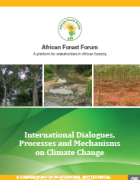Climate change is a global challenge that requires global solutions as GHG emissions have the same impact on the atmosphere affecting everyone. In this regard, action by one country to reduce emissions will do little to slow global warming unless other countries also act accordingly. This means that effective strategies require commitment and action by all major emitting countries as human activities are contributing to climate change, primarily by releasing large amounts of CO2 and other GHGs into the atmosphere. The initial climate change dialogues were mainly at global level, but in recent times there have been many discussions on mitigation and adaptation that have been initiated at regional and national levels. In 1992, countries joined an international treaty called the United Nations Framework Convention on Climate Change (UNFCCC), to jointly consider activities needed to limit average global temperature increases, the resulting climate change, and how to cope with the impacts. By 1995, countries recognised that emission reductions provisions in the UNFCCC were deficient and began negotiations to support global responses to climate change which culminated in the adoption of the Kyoto Protocol (KP) in 1997. The Protocol consists of legally binding emission reduction targets by the developed countries. By 2010, other climate change mitigation and adaptation strategies had emerged to support Reduced Emissions from Deforestation and forest Degradation (REDD+) and the revision of KP.
This module introduces professionals and non-professionals to international dialogues and processes related to climate change, including global, regional, and national level responses to climate change. It also explores the preparedness of the African continent and dialogues, processes and mechanisms to addresses issues of climate change vulnerability, mitigation and adaptation at all levels. For purposes of learning, delivery methods include interactive lectures; group discussions; question and answer sessions; brainstorming and case study activities. Chapter 1 discusses the historical overview of international responses to climate change. Chapter 2 looks at the first multilateral organisations tasked to address climate change, including the World Meteorological Organisation (WMO) and United Nations Environment Programme (UNEP). Chapter 3 is an overview of the UNFCCC, its objectives, principles, actors and institutional arrangement. Chapter 4 is based on a critical analysis of the KP market-based mechanisms of Emissions Trading (ET), Joint Implementation (JI) and Clean Development Mechanism (CDM). Chapter 5 discusses other strategies for climate change mitigation including REDD+. Chapter 6 discusses Africa’s preparedness and position in climate change negotiations including participation in international and regional initiatives. Finally, in chapter 7, national CC dialogues, processes and mechanisms are discussed.

